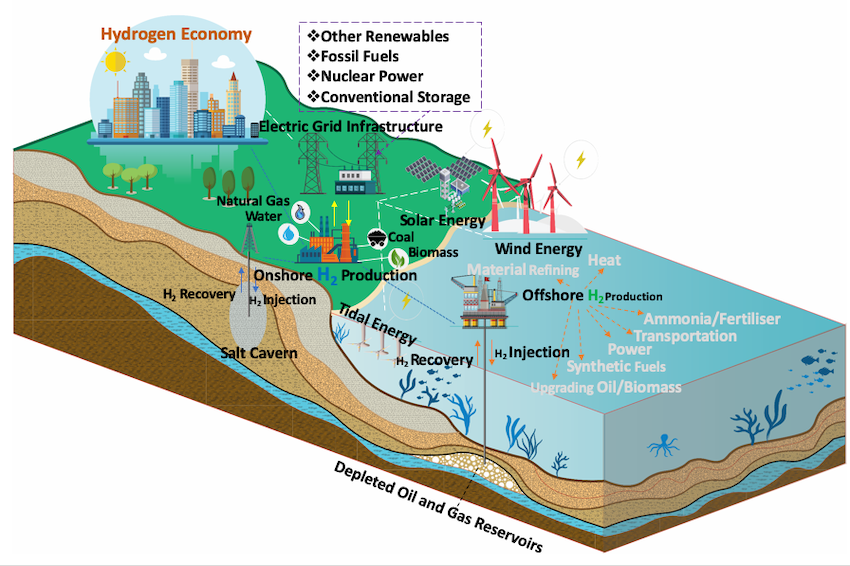By Virginia Marsh
Offshore hydrogen storage holds great potential to advance the development of the hydrogen economy to the scale required to achieve net zero carbon by 2050. Hydrogen can be securely stored in offshore geological formations while, for almost all countries, access to one depleted offshore gas reservoir would provide enough capacity to cover seasonal energy storage needs. These are among the findings explored in a wide-ranging new paper by HyStorPor researchers published in ACS Energy Letters.
It comes as hydrogen is attracting global attention for its potential as an alternative energy source to help decarbonise transport, heating and energy-intensive industries, such as chemicals and steel-making. Critically, it can alleviate a key drawback of renewable energy generation – its intermittency. Excess renewable energy can be converted to hydrogen through electrolysis (so-called "green hydrogen"), stored and turned back into electricity during periods of high energy demand.
“We have the technology for safely storing hydrogen developed through decades of experience with natural gas storage. Our research shows that storing hydrogen underground is even more secure than natural gas,” said Dr Aliakbar Hassanpouryouzband, a HyStorPor researcher at the University of Edinburgh and the paper’s lead author.
“Our paper also sets out the tools to monitor stored hydrogen and increase confidence in the security of the storage site.”

The paper suggests there will be limited competition with CO2 storage for space because hydrogen will require just one large storage reservoir, said Dr Edris Joonaki of TÜV SÜD NEL, the technology consultancy and another of the paper’s authors. “Both of these crucial decarbonisation technologies could work in parallel to limit global climate change.”
Funded by the Engineering and Physical Sciences Research Council, HyStorPor is researching the feasibility of storing hydrogen in UK reservoir rocks. ACS Energy Letters invited the HyStorPor researchers to contribute the paper, published as a viewpoint article.
Repurposing existing gas fields could reduce the cost of developing hydrogen storage sites and avoid expensive decommissioning of the existing oil and gas infrastructure. Offshore production of hydrogen from electrolysis, powered by rapidly expanding renewable energy sources, may also be possible on existing rigs, creating a circular economy for offshore hydrogen generation and storage.
“An important unknown for the world's clean economy has been how to store energy from summer to winter – the world’s largest batteries are a million times too small in capacity. Our work has discovered that empty natural gas fields can solve this problem. Massive storage of energy will be essential, and we have found a resource to do that rapidly, using existing technology,” said Professor Stuart Haszeldine of the University of Edinburgh.
“It is important to recognise that hydrogen is not in competition with renewable electricity – both low-carbon technologies are required to reach our climate targets. Hydrogen can provide vital energy storage to support increased generation of renewable electricity,” added Dr Katriona Edlmann, also of the University of Edinburgh.
The next challenges for offshore hydrogen storage will be developing the policy, social acceptance and economic aspects, said Dr Hassanpouryouzband.
“From the scientific and technical points of view, offshore subsurface hydrogen storage is ready for pilot tests.”


